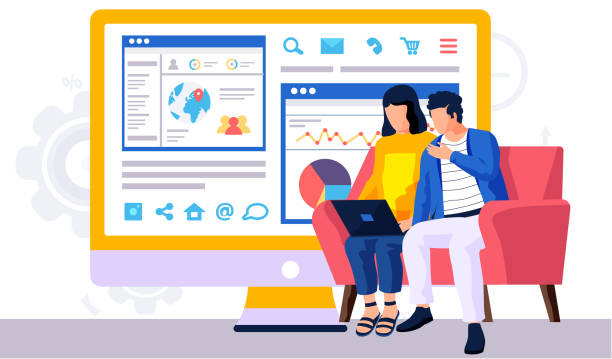مقدمه ای بر سئو خارجی و اهمیت آن
![]()
سئو خارجی یا Off-Page SEO، به مجموعهای از فعالیتها اشاره دارد که خارج از وبسایت شما انجام میشوند و هدف آنها بهبود رتبه و افزایش اعتبار دامنه در موتورهای جستجو است.
این بخش از بهینهسازی وبسایت، مکمل حیاتی سئو داخلی بوده و بدون آن، رسیدن به رتبههای برتر در نتایج جستجو تقریبا غیرممکن است.
اهمیت سئو خارجی در این است که موتورهای جستجو، به ویژه گوگل، وبسایت شما را بر اساس سیگنالهایی که از منابع خارجی دریافت میکنند، قضاوت میکنند.
این سیگنالها نشاندهنده میزان اعتبار، محبوبیت و قابل اعتماد بودن محتوای شما هستند.
به عنوان مثال، وقتی وبسایتهای معتبر به شما لینک میدهند، این یک رأی اعتماد محسوب میشود که به گوگل میفهماند محتوای شما ارزشمند است.
از این رو، سئو خارجی یک عنصر جداییناپذیر در هر استراتژی سئو موفق به شمار میرود.
برای #افزایش_بازدید، #رتبه_بندی و بهبود #اعتبار_دامنه، تمرکز بر #سئو_خارجی و #بک_لینکهای باکیفیت ضروری است.
در دنیای رقابتی امروز اینترنت، جایی که میلیونها وبسایت بر سر رتبههای بالا در حال رقابت هستند، تنها داشتن محتوای عالی کافی نیست.
شما باید اعتبار خود را در خارج از وبسایتتان نیز ثابت کنید.
این فعالیتها شامل لینکسازی از وبسایتهای دیگر (بکلینک)، سیگنالهای شبکههای اجتماعی، ذکر نام برند (Brand Mentions) و بازاریابی محتوا میشوند.
هر یک از این عوامل به موتورهای جستجو کمک میکنند تا درک بهتری از جایگاه وبسایت شما در صنعت مربوطه پیدا کنند.
سئو خارجی (Off-page SEO) به معنای ساختن پلی از اعتبار از خارج به سمت وبسایت شماست.
این بخش اموزشی به شما نشان میدهد که چگونه میتوان با استراتژیهای درست، نفوذ خود را در فضای آنلاین افزایش داد.
همچنین به عنوان یک بخش توضیحی، به شما کمک میکند تا مفهوم و اهمیت این بخش حیاتی سئو را به طور کامل درک کنید.
به یاد داشته باشید که موفقیت در سئو، یک فرایند مداوم است و سئو خارجی نقش تعیینکنندهای در این مسیر ایفا میکند.
این فرایند نیازمند صبر، استراتژی و اجرای دقیق است تا بتواند نتایج پایدار و مثبتی را برای وبسایت شما به ارمغان آورد.
از از دست دادن مشتریانی که سایت فروشگاهی حرفهای ندارید نگرانید؟
با طراحی سایت فروشگاهی توسط رساوب، این نگرانیها را فراموش کنید!
✅ افزایش چشمگیر فروش و نرخ تبدیل بازدیدکننده به مشتری
✅ طراحی حرفهای و کاربرپسند که اعتماد مشتری را جلب میکند
⚡ دریافت مشاوره رایگان از رساوب
تفاوت سئو داخلی و سئو خارجی

برای درک بهتر مفهوم سئو خارجی، ابتدا باید تفاوت آن را با سئو داخلی (On-Page SEO) مشخص کنیم.
سئو داخلی شامل تمام بهینهسازیهایی است که در داخل خود وبسایت شما انجام میشود؛ از جمله بهینهسازی محتوا، کلمات کلیدی، متا تگها، سرعت بارگذاری سایت، ساختار URL، بهینهسازی تصاویر و قابلیت استفاده موبایل.
هدف سئو داخلی این است که وبسایت شما برای موتورهای جستجو قابل فهم باشد و ارزش محتوای شما را به بهترین نحو نشان دهد.
اما سئو خارجی، همانطور که از نامش پیداست، به فعالیتهایی خارج از وبسایت شما میپردازد.
این فعالیتها به موتورهای جستجو نشان میدهند که وبسایت شما چقدر در فضای آنلاین معتبر و محبوب است.
به عبارت دیگر، سئو داخلی مانند آمادهسازی یک کتابخانه عالی با کتابهای مرتب و باکیفیت است، در حالی که سئو خارجی به معنای تبلیغ این کتابخانه در میان مردم و جلب نظر دیگران برای معرفی و ارجاع به آن است.
مهمترین بخش سئو خارجی، لینکسازی (Link Building) است.
بکلینکها یا لینکهای ورودی از وبسایتهای دیگر به سایت شما، مانند رایهای اعتمادی هستند که به گوگل میگویند محتوای شما ارزش اشاره و ارجاع را دارد.
هرچه تعداد و کیفیت این بکلینکها بیشتر باشد، اعتبار دامنه (Domain Authority) وبسایت شما نزد موتورهای جستجو افزایش مییابد و این به نوبه خود به بهبود رتبه شما کمک میکند.
این یک رویکرد تحلیلی است که نشان میدهد چگونه دو بخش سئو مکمل یکدیگر عمل میکنند.
بدون سئو داخلی قوی، حتی بهترین استراتژیهای سئو خارجی نیز ممکن است به نتایج مطلوب منجر نشوند، زیرا موتورهای جستجو نمیتوانند محتوای شما را به درستی درک کنند.
به همین ترتیب، بدون سئو خارجی موثر، وبسایت شما ممکن است در میان رقبا گم شود، حتی اگر بهترین محتوا را داشته باشد.
این همافزایی بین سئو داخلی و سئو خارجی، کلید موفقیت در رتبهبندیهای گوگل است.
درک این تفاوتها و چگونگی کارکرد این دو بخش در کنار هم، برای هر کسی که به دنبال بهبود دیداری وبسایت خود در موتورهای جستجو است، حیاتی است.
این بخش توضیحی و تخصصی برای روشنسازی این مفاهیم بنیادی طراحی شده است.
بکلینکسازی قلب سئو خارجی
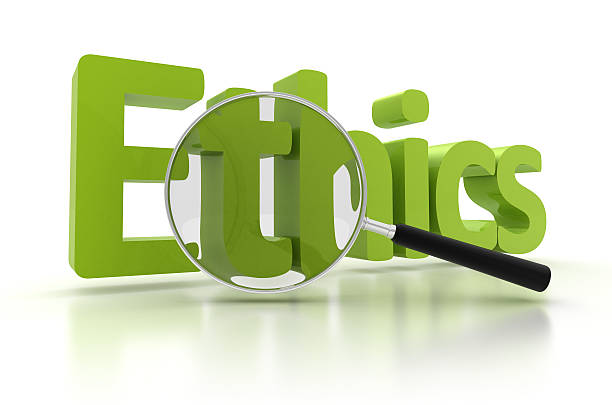
بکلینکها، شریان حیاتی هر استراتژی سئو خارجی موفق هستند.
این لینکهای ورودی از سایتهای دیگر به وبسایت شما، سیگنالهای قوی به موتورهای جستجو میفرستند که محتوای شما معتبر، مفید و قابل اعتماد است.
هرچه وبسایتی که به شما لینک میدهد از اعتبار دامنه (Domain Authority) بالاتری برخوردار باشد و ارتباط موضوعی بیشتری با سایت شما داشته باشد، ارزش آن بکلینک نیز بیشتر خواهد بود.
کیفیت بکلینکها از کمیت آنها مهمتر است.
یک بکلینک از یک وبسایت خبری معتبر و پربازدید، میتواند ارزشی معادل دهها بکلینک از سایتهای کماعتبار و غیرمرتبط داشته باشد.
انکر تکست (Anchor Text) یا متن لینکدهنده نیز نقش مهمی در سئو خارجی ایفا میکند.
انکر تکست متنی است که لینک در آن قرار داده شده است.
استفاده از انکر تکستهای متنوع و مرتبط با کلمات کلیدی هدف شما، به گوگل کمک میکند تا درک بهتری از محتوای صفحه مقصد پیدا کند.
اما باید مراقب باشید که از یک انکر تکست بیش از حد استفاده نکنید، زیرا این کار میتواند به عنوان یک تکنیک اسپم شناسایی شود و به جای کمک، به سایت شما آسیب بزند.
برای سئو خارجی، تنوع در نوع بکلینکها و منابع آنها نیز مهم است.
به عنوان مثال، بکلینک از مقالات مهمان، دایرکتوریها، فرومها، و لینکهای شکسته، هر کدام ارزش خاص خود را دارند و ترکیبی از آنها میتواند پروفایل لینک شما را طبیعیتر و قویتر کند.
این بخش تخصصی، عمق اهمیت بکلینکسازی را نشان میدهد.
| نوع بکلینک | توضیحات | تاثیر بر سئو خارجی |
|---|---|---|
| لینکهای مقالات مهمان (Guest Post Links) | لینکهایی که از طریق نوشتن مقاله برای وبسایتهای دیگر و قرار دادن لینک خود در آن مقاله بدست میآیند. | بسیار موثر؛ کیفیت بالا، مرتبط و دارای اعتبار. |
| لینکهای شکسته (Broken Link Building) | پیدا کردن لینکهای شکسته در سایتهای دیگر و پیشنهاد جایگزینی آنها با محتوای مشابه از سایت خود. | موثر؛ معمولاً ارزش بالا و نشاندهنده محتوای مفید. |
| لینکهای دایرکتوری (Directory Links) | ثبت وبسایت در دایرکتوریهای معتبر و مرتبط. | کمتر موثر از گذشته، اما برای سیگنال اولیه مفید است. |
| لینکهای شبکههای اجتماعی (Social Media Links) | لینکهای به اشتراک گذاشته شده در پلتفرمهای اجتماعی. | مستقیماً بر رتبه تاثیر ندارد، اما سیگنالهای اجتماعی مهمی است. |
| لینکهای فروم و انجمن (Forum Links) | لینکهایی که در بحثهای مرتبط فرومها و انجمنها قرار میگیرند. | اگر مرتبط و طبیعی باشند، میتوانند مفید باشند؛ در غیر این صورت اسپم محسوب میشوند. |
راهنمایی صحیح در این زمینه این است که همیشه بر کیفیت لینکها تاکید کنید، نه فقط بر تعداد.
لینکهای بیکیفیت یا اسپم میتوانند به جای بهبود رتبه، به سایت شما آسیب بزنند و حتی منجر به پنالتی گوگل شوند.
به همین دلیل، نظارت مداوم بر پروفایل بکلینکها و رد کردن لینکهای مضر (Disavow) از طریق گوگل سرچ کنسول یک بخش حیاتی از مدیریت سئو خارجی است.
استراتژیهای موثر در لینکسازی
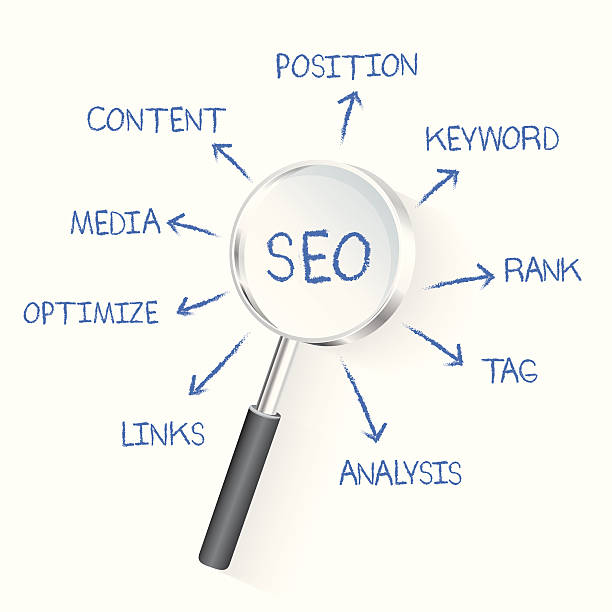
ساخت بکلینکهای با کیفیت، نیازمند یک استراتژی دقیق و هدفمند است.
این فرایند تنها به معنای جمعآوری هر نوع لینکی نیست، بلکه باید بر جذب لینکهای مرتبط، معتبر و طبیعی تمرکز کرد.
یکی از موثرترین استراتژیها برای سئو خارجی، تولید محتوای ارزشمند و قابل اشتراکگذاری است.
وقتی محتوای شما به قدری عالی باشد که دیگران به طور طبیعی بخواهند به آن لینک دهند، این بهترین نوع بکلینک است.
این محتوا میتواند شامل اینفوگرافیکها، مطالعات موردی، تحقیقات اصلی یا مقالات جامع و عمیق باشد.
لینکسازی با مقالات مهمان (Guest Posting) یکی دیگر از روشهای پرکاربرد و موثر است.
در این روش، شما برای وبسایتهای مرتبط در حوزه خودتان مقاله مینویسید و در ازای آن، یک یا چند لینک به سایت خودتان دریافت میکنید.
این روش نه تنها به شما بکلینک میدهد، بلکه به افزایش آگاهی از برند و جذب ترافیک ارجاعی نیز کمک میکند.
پیدا کردن فرصتهای لینکسازی شکسته (Broken Link Building) نیز یک استراتژی هوشمندانه است.
در این روش، شما لینکهای شکسته در وبسایتهای دیگر را پیدا میکنید و سپس به صاحبان آن سایتها پیشنهاد میدهید که محتوای مشابه و مرتبط خود را به عنوان جایگزین آن لینک شکسته قرار دهند.
تحلیل رقبا نیز یک بخش حیاتی در سئو خارجی است.
با بررسی پروفایل بکلینکهای رقبای موفق خود، میتوانید فرصتهای جدیدی برای لینکسازی شناسایی کنید.
ابزارهایی مانند Ahrefs و SEMrush به شما کمک میکنند تا ببینید رقبای شما از کجا لینک میگیرند و شما نیز میتوانید تلاش کنید از همان منابع لینک دریافت کنید.
در نهایت، رسانه اجتماعی و فعالیت در انجمنهای تخصصی نیز میتواند به طور غیرمستقیم به سئو خارجی شما کمک کند.
اگرچه لینکهای شبکههای اجتماعی مستقیماً به عنوان بکلینک طبقهبندی نمیشوند، اما میتوانند به افزایش دید محتوای شما، جذب ترافیک و در نهایت ایجاد فرصتهای لینکسازی طبیعی منجر شوند.
این یک رویکرد اموزشی و راهنمایی است که به شما کمک میکند تا استراتژیهای موفقی را پیادهسازی کنید.
از اینکه وبسایت شرکتتان آنطور که شایسته است، دیده نمیشود و مشتریان بالقوه را از دست میدهید خسته شدهاید؟ با طراحی سایت حرفهای و اثربخش توسط رساوب، این مشکل را برای همیشه حل کنید!
✅ افزایش اعتبار برند و جلب اعتماد مشتریان
✅ جذب سرنخهای فروش هدفمند
⚡ همین حالا برای دریافت مشاوره رایگان با ما تماس بگیرید!
ابزارهای حیاتی برای تحلیل سئو خارجی
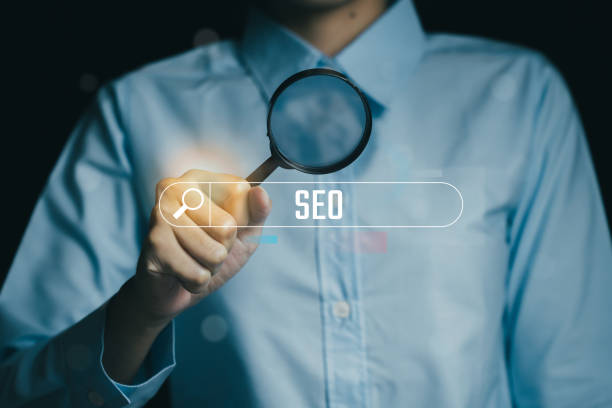
برای اجرای موثر استراتژیهای سئو خارجی و نظارت بر پیشرفت آنها، استفاده از ابزارهای تخصصی ضروری است.
این ابزارها به شما امکان میدهند تا پروفایل بکلینک خود و رقبایتان را تحلیل کنید، فرصتهای جدید لینکسازی را کشف کنید و لینکهای مضر را شناسایی نمایید.
یکی از قدرتمندترین ابزارها در این زمینه، Ahrefs است.
Ahrefs یک پایگاه داده عظیم از بکلینکها دارد و اطلاعات جامعی در مورد دامنههای لینکدهنده، انکر تکستها، اعتبار دامنه و ترافیک ارجاعی ارائه میدهد.
با استفاده از Ahrefs میتوانید به راحتی بکلینکهای رقبا را بررسی کرده و شکافهای لینکسازی خود را شناسایی کنید.
SEMrush یکی دیگر از ابزارهای جامع سئو است که بخش قدرتمندی برای تحلیل سئو خارجی دارد.
این ابزار علاوه بر تحلیل بکلینک، به شما امکان میدهد کلمات کلیدی، رتبهبندیها و ترافیک رقبا را نیز بررسی کنید.
قابلیتهای Audit Backlink آن برای شناسایی و مدیریت لینکهای سمی بسیار مفید است.
Moz Pro نیز با ابزارهایی مانند Link Explorer و Domain Authority Checker، به شما کمک میکند تا اعتبار دامنه خود و دیگر سایتها را ارزیابی کرده و فرصتهای لینکسازی با کیفیت را پیدا کنید.
Domain Authority (DA) و Page Authority (PA) معیارهایی هستند که توسط Moz ایجاد شدهاند و نشاندهنده قدرت رتبهبندی یک دامنه یا صفحه هستند.
گوگل سرچ کنسول (Google Search Console) هرچند یک ابزار تحلیل بکلینک نیست، اما اطلاعات حیاتی در مورد لینکهای خارجی به سایت شما ارائه میدهد و مهمتر از آن، ابزار Disavow Links را برای رد کردن لینکهای اسپم در اختیار شما قرار میدهد که برای مدیریت سئو خارجی بسیار حیاتی است.
این ابزار تخصصی و راهنمایی به وبمسترها کمک میکند تا با دیدی جامع و دقیق، بر استراتژیهای لینکسازی خود نظارت کنند و از سلامت پروفایل لینک خود اطمینان حاصل نمایند.
با بهرهگیری از این ابزارها، میتوانید به طور موثری در مسیر موفقیت سئو خارجی گام بردارید.
لینکهای اسپم و راههای مقابله با آنها

در دنیای سئو خارجی، همانقدر که لینکهای باکیفیت میتوانند مفید باشند، لینکهای اسپم و بیکیفیت نیز میتوانند به سایت شما آسیب بزنند.
لینکهای اسپم، معمولاً از وبسایتهای غیرمرتبط، کماعتبار، یا با اهداف دستکاری الگوریتمها ایجاد میشوند.
این لینکها میتوانند شامل لینکهای خریداریشده در مقیاس بزرگ، لینک از سایتهای دارای محتوای نامناسب، یا لینکهایی که به صورت خودکار ایجاد شدهاند، باشند.
گوگل با الگوریتمهایی مانند پنگوئن، همواره در حال مبارزه با چنین روشهای غیرقانونی لینکسازی است و شناسایی و جریمه وبسایتهایی که از آنها استفاده میکنند.
شناسایی لینکهای اسپم یک بخش مهم از مدیریت سئو خارجی است.
نشانههایی مانند:
- لینک از سایتهایی با زبان یا محتوای کاملاً نامرتبط.
- لینک از سایتهای با اعتبار دامنه بسیار پایین (DA/DR پایین).
- لینکهای بیش از حد با انکر تکستهای کاملاً کلمات کلیدی.
- لینک از شبکههای خصوصی وبلاگ (PBNs) که هدفشان فقط دستکاری رتبه است.
راهنمایی میکند که به سلامت پروفایل لینک خود توجه کنید.
پس از شناسایی لینکهای اسپم، گام بعدی مقابله با آنها است.
ابزار Disavow Links در گوگل سرچ کنسول، به شما امکان میدهد تا به گوگل بگویید که مایل نیستید اعتبار این لینکهای خاص را به وبسایت خود مرتبط کنید.
این کار به گوگل کمک میکند تا این لینکها را در هنگام ارزیابی سایت شما نادیده بگیرد و از جریمههای احتمالی جلوگیری کند.
فرایند Disavow کردن باید با دقت زیادی انجام شود، زیرا رد کردن لینکهای معتبر به اشتباه میتواند به رتبه شما آسیب بزند.
برای این کار، ابتدا باید یک لیست دقیق از تمام لینکهای مشکوک تهیه کرده و سپس آنها را در یک فایل متنی بارگذاری کرده و به سرچ کنسول ارسال کنید.
این یک عمل تخصصی است که برای حفظ سلامت سئو خارجی ضروری است.
نظارت منظم و اقدامات پیشگیرانه در این زمینه، شما را از خطرات احتمالی حفظ خواهد کرد.
بررسی فاکتورهای تاثیرگذار بر رتبه با سئو خارجی

در حالی که بکلینکها ستون فقرات سئو خارجی را تشکیل میدهند، عوامل دیگری نیز وجود دارند که به طور غیرمستقیم یا مستقیم بر رتبه وبسایت شما از طریق فعالیتهای خارج از سایت تاثیر میگذارند.
یکی از این عوامل، سیگنالهای شبکههای اجتماعی است.
اگرچه لینکهای به اشتراک گذاشته شده در پلتفرمهایی مانند توییتر، فیسبوک، لینکدین و اینستاگرام به طور مستقیم به عنوان بکلینکهای رتبهبندی محسوب نمیشوند، اما میتوانند به افزایش دید محتوای شما، جذب ترافیک و در نهایت ایجاد فرصتهای لینکسازی طبیعی منجر شوند.
محتوایی که وایرال میشود، شانس بیشتری برای دریافت بکلینک از وبسایتهای خبری یا وبلاگهای دیگر دارد.
ذکر نام برند (Brand Mentions) یا اشاره به برند شما در وبسایتها، مقالات خبری یا پادکستها، حتی اگر لینک مستقیمی به سایت شما داده نشود، میتواند سیگنال مهمی برای گوگل باشد.
این ذکر نامها نشان میدهند که برند شما شناخته شده و معتبر است.
گوگل میتواند این ذکر نامها را شناسایی کرده و به عنوان یک عامل مثبت در رتبهبندی در نظر بگیرد.
سئو محلی (Local SEO) نیز یک جنبه مهم دیگر از سئو خارجی است، به ویژه برای کسبوکارهایی که به دنبال جذب مشتریان محلی هستند.
فهرست کردن کسبوکار شما در دایرکتوریهای محلی، دریافت نظرات مثبت در Google My Business و دیگر پلتفرمهای بررسی، و ساختن نام، آدرس و شماره تلفن (NAP) یکپارچه در سراسر وب، میتواند اعتبار محلی شما را به شدت افزایش دهد.
همه این عوامل با هم یک تصویر جامع از اعتبار و محبوبیت وبسایت شما در خارج از مرزهای آن ارائه میدهند.
آیا تا به حال فکر کردهاید که چگونه یک محتوای سوالبرانگیز یا یک کمپین وایرال میتواند به طور ناخواسته اما موثر، رتبه سئو خارجی شما را بالا ببرد؟ این فرایند یک تحلیلی عمیق از اکوسیستم آنلاین است.
بهینه سازی این عوامل به همراه استراتژیهای قوی لینکسازی، میتواند تفاوت قابل توجهی در عملکرد سئو خارجی وبسایت شما ایجاد کند و به شما کمک کند تا در رقابت با دیگران پیشی بگیرید.
| فاکتور | توضیحات | اهمیت در سئو خارجی |
|---|---|---|
| سیگنالهای شبکههای اجتماعی | اشتراکگذاریها، لایکها، کامنتها و میزان تعامل با محتوا در پلتفرمهای اجتماعی. | غیرمستقیم؛ افزایش دید، ترافیک و فرصت لینکسازی طبیعی. |
| ذکر نام برند (Brand Mentions) | اشاره به نام برند یا وبسایت در مقالات، پادکستها، ویدئوها بدون لینک مستقیم. | مهم؛ نشاندهنده اعتبار و محبوبیت برند. |
| لینکهای محلی (Local Citations) | ثبت نام، آدرس و شماره تلفن (NAP) کسبوکار در دایرکتوریهای محلی. | بسیار مهم برای سئو محلی؛ افزایش اعتبار محلی. |
| نظرات و رتبهبندیها (Reviews & Ratings) | نظرات کاربران در پلتفرمهایی مانند Google My Business، Yelp و … | مهم؛ تاثیر بر اعتماد کاربر و موتور جستجو. |
| ترافیک ارجاعی (Referral Traffic) | بازدیدکنندگانی که از طریق لینکهای موجود در سایتهای دیگر به وبسایت شما میآیند. | مهم؛ نشاندهنده ارزش محتوا و محبوبیت. |
پنالتیهای گوگل و ارتباط آن با سئو خارجی غیر اصولی
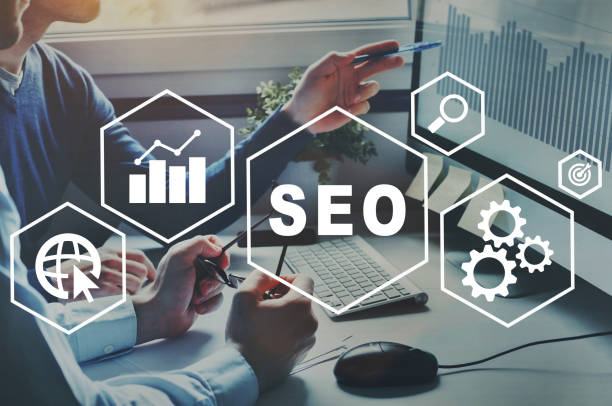
یکی از بزرگترین خطرات در زمینه سئو خارجی، مواجه شدن با پنالتیهای گوگل است.
گوگل الگوریتمهای پیچیدهای برای شناسایی وبسایتهایی دارد که سعی میکنند با روشهای غیرقانونی و اسپمآمیز (Black Hat SEO) رتبه خود را دستکاری کنند.
الگوریتم پنگوئن (Penguin) گوگل که در سال ۲۰۱۲ معرفی شد، به طور خاص برای شناسایی و جریمه وبسایتهایی طراحی شده است که دارای پروفایل بکلینک غیرطبیعی و اسپم هستند.
این پنالتیها میتوانند به صورت دستی توسط بازبینان گوگل اعمال شوند یا به صورت الگوریتمی و خودکار توسط پنگوئن.
پنالتیهای گوگل میتوانند تأثیر مخربی بر رتبه و ترافیک وبسایت شما داشته باشند.
یک وبسایت پنالتی شده ممکن است به طور کامل از نتایج جستجو حذف شود یا رتبه آن به شدت افت کند، که این به معنای از دست دادن حجم زیادی از ترافیک ارگانیک و درآمدهای مرتبط است.
مهمترین دلیل برای پنالتیهای مرتبط با سئو خارجی، استفاده از روشهای لینکسازی غیرطبیعی است، مانند خرید لینک در مقیاس بزرگ، تبادل لینکهای بیرویه، استفاده از شبکههای خصوصی وبلاگ (PBNs)، یا لینکهای اسپم از بخش کامنتها و انجمنها.
این فعالیتها در تضاد با دستورالعملهای وبمستر گوگل هستند.
برای جلوگیری از این پنالتیها، باید همواره بر لینکسازی طبیعی و باکیفیت تمرکز کنید و از هرگونه تکنیک “Black Hat” پرهیز نمایید.
نظارت مداوم بر پروفایل بکلینک و استفاده از ابزار Disavow Links برای رد کردن هرگونه لینک مشکوک یا اسپم، حیاتی است.
این بخش خبری و توضیحی، اهمیت رعایت اصول اخلاقی در سئو خارجی را نشان میدهد.
اگر وبسایت شما دچار پنالتی شده باشد، بازگرداندن آن به حالت عادی نیازمند زمان، تلاش و یک استراتژی جامع برای پاکسازی لینکهای مضر و بازسازی اعتبار است.
این امر نشان میدهد که سرمایهگذاری در سئو خارجی صحیح و اصولی، نه تنها به بهبود رتبه کمک میکند، بلکه از وبسایت شما در برابر خطرات احتمالی محافظت مینماید.
از دست دادن سرنخهای تجاری به دلیل سایت غیرحرفهای چقدر برایتان هزینه دارد؟ با طراحی سایت شرکتی حرفهای توسط رساوب، این مشکل را برای همیشه حل کنید!
✅ افزایش اعتبار و اعتماد مشتریان بالقوه
✅ جذب آسانتر سرنخهای تجاری جدید
⚡ همین حالا مشاوره رایگان بگیرید!
آینده سئو خارجی و تحولات پیشرو
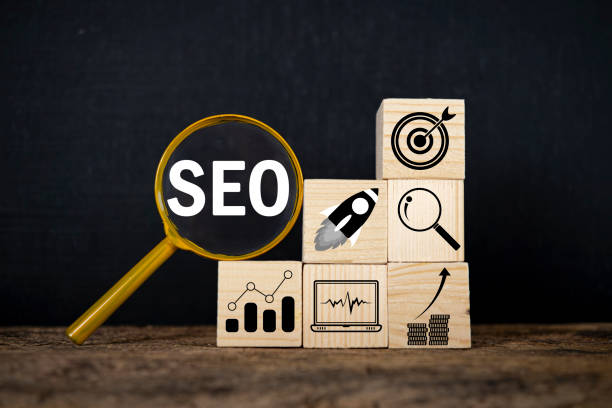
دنیای سئو همواره در حال تغییر و تکامل است و سئو خارجی نیز از این قاعده مستثنی نیست.
با پیشرفتهای هوش مصنوعی (AI) و الگوریتمهای یادگیری ماشین، گوگل هر روز در درک پیچیدگیهای زبان و نیت کاربر هوشمندتر میشود.
این به معنای آن است که کیفیت و ارتباط معنایی بکلینکها بیش از پیش اهمیت پیدا خواهد کرد.
دیگر صرفاً تعداد لینکها مهم نیست، بلکه ارتباط موضوعی لینکدهنده با محتوای شما و اعتبار واقعی آن وبسایت در حوزه تخصصی خود، نقش محوری ایفا میکند.
این یک نگاه تحلیلی به آینده است.
مفهوم E-A-T (Expertise, Authoritativeness, Trustworthiness) که توسط گوگل معرفی شده است، در آینده سئو خارجی نقش پررنگتری خواهد داشت.
گوگل به دنبال وبسایتهایی است که محتوای آنها توسط متخصصان تولید شده، دارای اعتبار در حوزه خود هستند و قابل اعتماد میباشند.
لینکسازی از منابعی که خودشان دارای E-A-T بالایی هستند، اهمیت بیشتری پیدا خواهد کرد.
به همین دلیل، روابط عمومی دیجیتال (Digital PR) و بازاریابی تأثیرگذار (Influencer Marketing) بیش از پیش با سئو خارجی در هم تنیده خواهند شد.
ایجاد روابط با خبرنگاران، وبلاگنویسان و تأثیرگذاران حوزه شما میتواند به انتشار محتوای شما در سایتهای معتبر و در نتیجه جذب بکلینکهای باکیفیت و ذکر نام برند منجر شود.
همچنین، انتظار میرود که سیگنالهای مربوط به تجربه کاربری (UX) و تعامل کاربران با محتوا، مانند نرخ کلیک (CTR) در نتایج جستجو و زمان ماندگاری در سایت، به طور فزایندهای بر ارزش سئو خارجی تاثیر بگذارند.
این بدان معناست که یک بکلینک تنها در صورتی ارزش واقعی خود را نشان میدهد که ترافیک مفید و تعامل مثبتی را به همراه داشته باشد.
در نهایت، سئو خارجی در آینده بیشتر به سمت «جذب» لینکهای طبیعی از طریق محتوای عالی و «ارتباطات» قوی با دیگر وبسایتها و افراد معتبر حرکت خواهد کرد تا «ساخت» لینک به روشهای قدیمی.
این یک چشمانداز سرگرمکننده است که نشان میدهد چگونه نوآوریها در هوش مصنوعی، شیوه کار ما در سئو را متحول میکنند و به سمت روشهای اخلاقیتر و طبیعیتر سوق میدهند.
جمعبندی و نکات کلیدی برای موفقیت در سئو خارجی
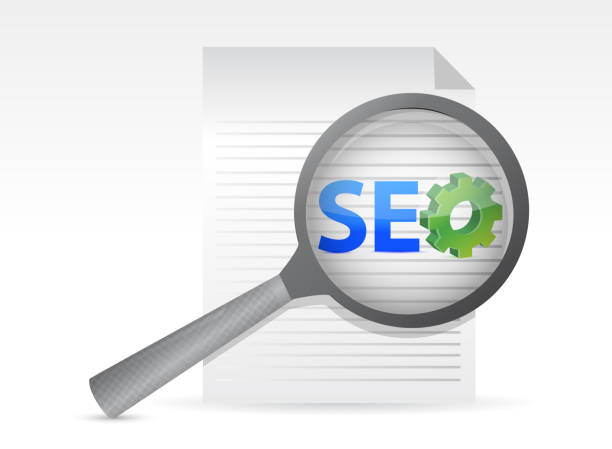
در این مقاله به بررسی جامع سئو خارجی و ابعاد مختلف آن پرداختیم.
دریافتیم که سئو خارجی صرفاً یک تکنیک نیست، بلکه یک استراتژی بلندمدت است که بر پایه اعتبار، اعتماد و روابط بنا شده است.
برای کسب موفقیت پایدار در این حوزه، به نکات کلیدی زیر توجه کنید:
- تمرکز بر کیفیت، نه کمیت: همیشه به دنبال بکلینکهای با کیفیت بالا از وبسایتهای معتبر و مرتبط با حوزه فعالیت خود باشید.
یک لینک باکیفیت میتواند ارزشی بیش از دهها لینک بیکیفیت داشته باشد. - تولید محتوای ارزشمند: محتوای شما باید به قدری خوب باشد که دیگران به طور طبیعی بخواهند به آن لینک دهند.
محتوای آموزشی، تحقیقاتی و اطلاعاتی عمیق، بهترین ابزار برای جذب لینکهای طبیعی هستند. - تنوع در لینکسازی: از استراتژیهای متنوعی مانند مقالات مهمان، ترمیم لینکهای شکسته، و فعالیت در شبکههای اجتماعی برای ساخت پروفایل لینک طبیعی و قوی استفاده کنید.
- نظارت مداوم بر پروفایل بکلینک: به طور منظم پروفایل بکلینک خود را با ابزارهایی مانند Ahrefs و SEMrush بررسی کنید.
هرگونه لینک اسپم یا مشکوک را شناسایی و از طریق گوگل سرچ کنسول رد کنید (Disavow). - صبر و پایداری: سئو خارجی یک فرایند زمانبر است.
نتایج ممکن است بلافاصله ظاهر نشوند، اما با پیگیری مداوم و استراتژی صحیح، به مرور زمان شاهد بهبود قابل توجهی در رتبه و ترافیک سایت خود خواهید بود.
با پیادهسازی این راهنماییها و درک عمیق از ماهیت سئو خارجی، شما میتوانید اعتبار آنلاین خود را افزایش داده و در نهایت به رتبههای برتر در موتورهای جستجو دست یابید.
این یک مسیر اموزشی و پیوسته است که به استمرار و یادگیری نیاز دارد.
به یاد داشته باشید که هدف نهایی سئو خارجی، نه تنها فریب الگوریتمها، بلکه ایجاد یک اکوسیستم آنلاین سالم و معتبر برای وبسایت شماست.
سوالات متداول
| سوال (Question) | پاسخ (Answer) |
|---|---|
| سئو خارجی (Off-Page SEO) چیست؟ | سئو خارجی به مجموعهای از فعالیتها و روشهایی گفته میشود که خارج از وبسایت شما انجام میشوند تا رتبه آن در موتورهای جستجو بهبود یابد، مانند ساخت بکلینک. |
| چرا سئو خارجی برای وبسایت مهم است؟ | سئو خارجی به موتورهای جستجو نشان میدهد که وبسایت شما معتبر، محبوب و قابل اعتماد است، که به افزایش اعتبار دامنه و رتبهبندی کمک میکند. |
| مهمترین فاکتور در سئو خارجی کدام است؟ | بکلینکها (Backlinks) یا لینکهایی که از سایتهای دیگر به سایت شما داده میشوند، مهمترین فاکتور هستند، به خصوص اگر از سایتهای معتبر باشند. |
| بکلینک با کیفیت چه ویژگیهایی دارد؟ | بکلینک با کیفیت از سایتهای معتبر (با اتوریتی بالا)، مرتبط با موضوع سایت شما، و با انکر تکست مناسب (طبیعی) میآید. |
| آیا شبکههای اجتماعی در سئو خارجی نقش دارند؟ | بله، اشتراکگذاری محتوا در شبکههای اجتماعی میتواند به افزایش دید و ترافیک غیرمستقیم کمک کند و سیگنالهای اجتماعی مثبتی به موتورهای جستجو بفرستد. |
| PBN چیست و آیا توصیه میشود؟ | PBN (Private Blog Network) شبکهای از وبسایتهای خصوصی است که برای ساخت بکلینک به سایت اصلی استفاده میشود. گوگل این روش را اسپم میداند و استفاده از آن به شدت منع شده و میتواند منجر به جریمه شود. |
| لینک سازی طبیعی (Natural Link Building) چگونه انجام میشود؟ | با تولید محتوای ارزشمند و قابل اشتراکگذاری، برقراری ارتباط با وبلاگنویسان و اینفلوئنسرها، و جلب توجه رسانهها. |
| انکر تکست (Anchor Text) در بکلینک چیست؟ | متنی است که لینک در آن قرار داده شده است. استفاده از انکر تکستهای متنوع و مرتبط با کلمه کلیدی، طبیعیتر به نظر میرسد و به سئو کمک میکند. |
| سئو محلی (Local SEO) چه ارتباطی با سئو خارجی دارد؟ | سئو محلی شامل فعالیتهای خارج از سایت مانند ثبت در Google My Business، دایرکتوریهای محلی و دریافت نظرات آنلاین است که به کسبوکارها کمک میکند تا در نتایج جستجوی محلی ظاهر شوند. |
| چگونه میتوان بکلینکهای رقیب را بررسی کرد؟ | با استفاده از ابزارهایی مانند Ahrefs، Semrush یا Moz میتوانید پروفایل بکلینکهای رقبا را تحلیل کنید و فرصتهای لینکسازی جدید را شناسایی نمایید. |
و دیگر خدمات آژانس تبلیغاتی رسا وب در زمینه تبلیغات
سوشال مدیا هوشمند: خدمتی اختصاصی برای رشد افزایش فروش بر پایه هدفگذاری دقیق مخاطب.
UI/UX هوشمند: بهینهسازی حرفهای برای مدیریت کمپینها با استفاده از استفاده از دادههای واقعی.
UI/UX هوشمند: پلتفرمی خلاقانه برای بهبود بهبود رتبه سئو با سفارشیسازی تجربه کاربر.
گوگل ادز هوشمند: رشد آنلاین را با کمک استراتژی محتوای سئو محور متحول کنید.
کمپین تبلیغاتی هوشمند: ترکیبی از خلاقیت و تکنولوژی برای افزایش بازدید سایت توسط مدیریت تبلیغات گوگل.
و بیش از صد ها خدمات دیگر در حوزه تبلیغات اینترنتی ،مشاوره تبلیغاتی و راهکارهای سازمانی
تبلیغات اینترنتی | استراتژی تبلیعاتی | ریپورتاژ آگهی
منابع
راهنمای کامل سئو خارجی
عوامل افزایش رتبه در گوگل
بهبود رتبه گوگل با سئو خارجی
آموزش سئو خارجی پیشرفته
? با رساوب آفرین، کسبوکار شما در دنیای دیجیتال پرواز میکند! ما با ارائه خدماتی نظیر طراحی سایت امن، بهینهسازی موتورهای جستجو (SEO) و کمپینهای تبلیغاتی هدفمند، حضوری قدرتمند و ماندگار برای برند شما رقم میزنیم.
📍 تهران ، خیابان میرداماد ،جنب بانک مرکزی ، کوچه کازرون جنوبی ، کوچه رامین پلاک 6

